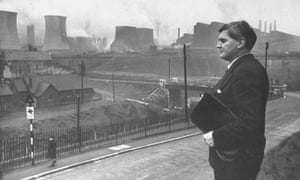At the Ebbw Vale steelworks in the south Wales valleys, thousands of men once laboured to produce the steel that helped to drive Britain’s industrial revolution. The steelworks closed for good 15 years ago, and today a familiar fare decorates the town’s mournful high street: pound shops, arcades, bookies. On the brief walk from one end to the other, I count three pawnbrokers.
“It ain’t worth looking for any work up here,” Rob Smyth, a youth worker tells me. “I tell you what – I’m glad I’m old because if I was young now I’d be struggling, you know? I know people who’ve got degrees and all the rest of it, and they can’t get work. You’ve got to settle somewhere else and make a life for yourself. There’s no life up here, no life at all. I only live here because it’s cheap, and it’s close to where I work.”
Ebbw Vale is the largest town in the county of Blaenau Gwent. This autumn the county was found to be the cheapest place to buy a home in England and Wales (averaging £777 per sq m in 2016, compared with £19,439 for the most expensive, London’s Kensington and Chelsea). It offers the second-lowest mean salary in Britain, and its GCSE results are the worst in Wales. Five food banks operate within an area of about 42 square miles.
People here are struggling economically and physically. It’s a grim irony that an area encompassing the former constituency of Aneurin Bevan, architect of the National Health Service, should today be facing a quietly unfolding health crisis. Some 12% of working-age residents receive government support for disability or incapacity – twice the national average. Life expectancy for both men and women is among the lowest in England and Wales. Out of a population of 60,000, one in every six adults is being prescribed an antidepressant, according to NHS data from 2013.
“GPs haven’t got time to listen, to talk to people, to find out what’s going on. They’ve got that five- or 10-minute slot, somebody’s in tears, they’re saying they’re depressed,” Tara Johnstone tells me at the Phoenix Project, the publicly funded drop-in centre where she works in nearby Brynmawr. It’s run by a local charity, Torfaen and Blaenau Gwent Mind, and people come to chat about their problems: anxiety, depression, illness, bereavement. Most stories revolve around the same theme.
“It’s lack of work,” explains Trish Richards, another Phoenix staff member. “I’ve had people come to me on zero-hours contracts. They don’t know where they are from one week to the next. Can’t plan. Can’t even plan to go to the dentist in case they get called in to work.”
In the face of so many present-day problems, it’s all too easy to become wistful for a lost golden era of nationalised industry that brought secure jobs and forged strong communities. The low-paid jobs in call centres and distribution sheds, most located in bigger cities, that eventually arrived to replace the noise and filth of the pits were cleaner and safer, but they lacked the solidarity and support networks. Soon they, too, may disappear.
First globalisation, then austerity; now automation looms on the horizon. South Wales is particularly vulnerable, being heavily reliant on exactly the low-skilled jobs which are easiest to send offshore and automate out of existence. If they go, then so too may the young people who commute to these jobs from places such as Blaenau Gwent.
“It’s the easiest thing in the world to put your foot on someone’s head when they’re drowning. And that’s what you see around here,” Wayne Hodgins, an independent councillor for Brynmawr, tells me when we meet in one of the few pubs that are still open. “There was factories employing 100, 200 people. That factory environment – your friends, your colleagues – became an extension of your family.”
The professionalisation of even entry-level work has made it very difficult to find employment without some form of academic qualification or accredited skill. Consequently, Hodgins says, people here can feel worthless because they are “getting rejection letters right, left and centre ... They’ve got nothing to get them out of bed in the morning.”
This, in many cases, can lead to a prescription for antidepressants. “There’s a lot of people on social [benefits], there’s a lot ill,” says Allan Price, a former miner who volunteers at the South Wales Miners’ museum amid the slopes of the Afan Valley, high above Port Talbot. “Everybody in my village will tell you they know them. And lots of them come from good men and good families – hardworking.”
The deindustrialisation experiment inflicted on the valleys in the 1980s offers a cautionary tale for the next big transition. The region stands as an example of how not to move from one form of economic life to another – the Thatcherite omelette left many broken eggs.
“Automation is a risk to many occupations across Wales and the UK,” says Professor Julie Lydon, chair of Universities Wales who recently wrote an article entitled The Robots are Coming.
The key to avoiding a repeat of the devastation caused when the mines and factories shut is investment in skills, according to Lydon. “Demand in Wales for jobs that require higher-level skills is increasing, and evidence shows these jobs are less vulnerable to automation. We must focus on developing skills which are with you for life, and make you more adaptable and employable through your career. This will mean building on existing collaboration between universities, employers and colleges, and finding new ways to provide these skills, such as through degree apprenticeships.”
This will require government and employers to take more action than they have so far been prepared to do. Research in 2014 indicated that employers in Wales lagged behind the rest of the country in offering training: just 62% said they had done so in the previous 12 months, compared to the UK average of 66%.
Nick Smith, MP for Blaenau Gwent, says some investment in road infrastructure has already arrived, and that the area must revive its tourist industry. “There’s been £200m provided by the Welsh government. We’ve also had in the last 10 years a new railway line from Cardiff to Ebbw Vale. If we improve transport infrastructure, I think it will help Blaenau Gwent as a destination, to enjoy the fantastic scenery. I’m a hiker, and there’s nothing better than to get up there and to fill your lungs with the fresh air.”
Rebuilding dignity
Cath Jones is 31 and before she showed up at the Phoenix Project looking for help, she’d been in and out of mental health institutions since she was 15. “In three, four years I had 50 admissions to a psychiatric ward,” she tells me over a cup of milky tea. “I was on five or six different antidepressants, antipsychotics, sleeping tablets, diazepam. You name it, I was on it.”
She insists she’d have been “six feet under” were it not for the help and advice she received at the Phoenix.
In terms of getting people fit, well and – eventually – back to work, Trish Richards tells me that the Westminster government is lukewarm about initiatives such as the Phoenix Project. “They don’t see the fact that somebody getting up in the morning, getting dressed and coming here is a big achievement,” she says. “They want outcomes, they want results, they want little boxes ticked.”
But Jones stands as proof of what schemes such as this can produce. Having stabilised her life, she now volunteers at the centre. She’s not alone: it has often been former service users themselves who helped to keep the project running.
“It’s people that have been there, done it and got the T-shirt,” says Richards, pointing proudly at Jones . “She’s brilliant at helping people because she’s been there. She’s been at rock bottom.”
The project may offer a lesson as to how to rebuild the dignity of the south Wales valleys. People can be knocked down by the sweep of powerful economic forces, but solidarity and compassion can help them back to their feet.
“Another lady [who came to us] – two years ago she had planned how she was going to kill herself, wasn’t going to tell anyone,” Richards tells me as I leave the Brynmawr community centre and head back to the relative prosperity of Bristol, just 50 miles away. “She’s now got three jobs in a school.”
- Hired: Six Months Undercover in Low-Wage Britain (Atlantic Books) by James Bloodworth is available to pre-order
- If you have experiences relating to this article that you’d like to share, please email us at inequality.project@theguardian.com





 选择“Disable on www.wenxuecity.com”
选择“Disable on www.wenxuecity.com”
 选择“don't run on pages on this domain”
选择“don't run on pages on this domain”

